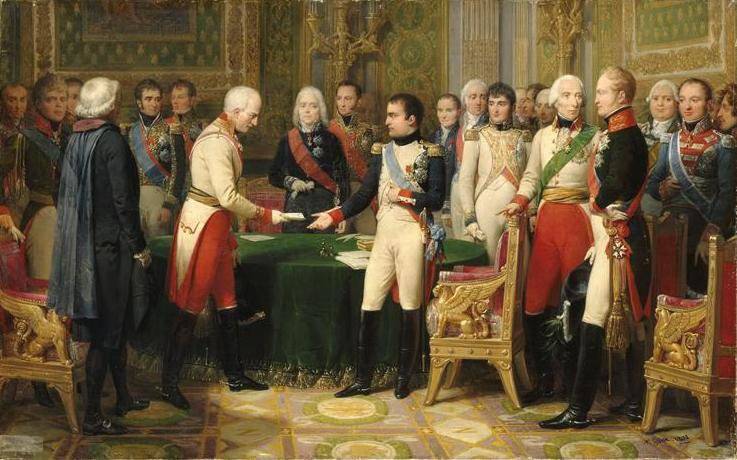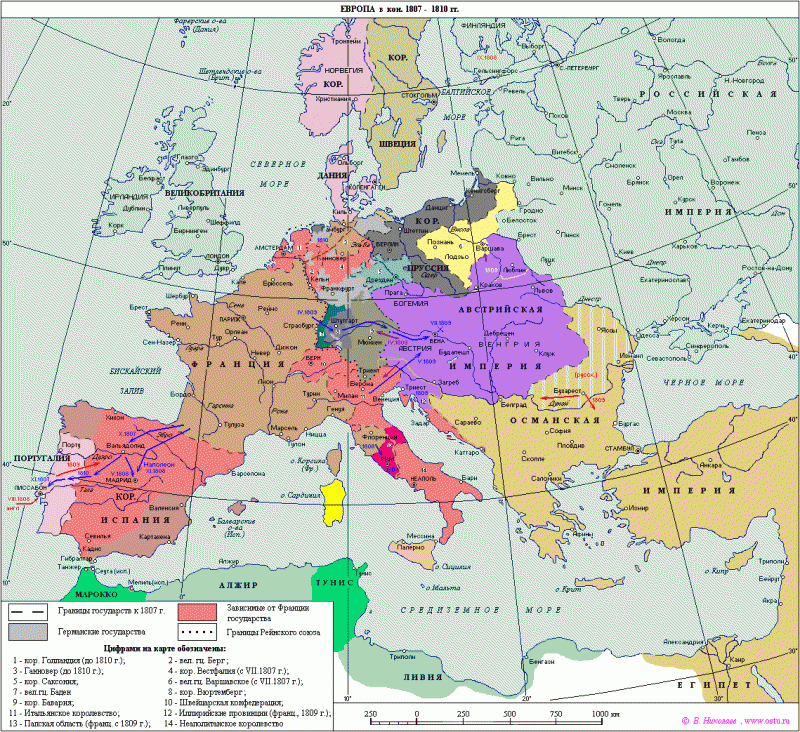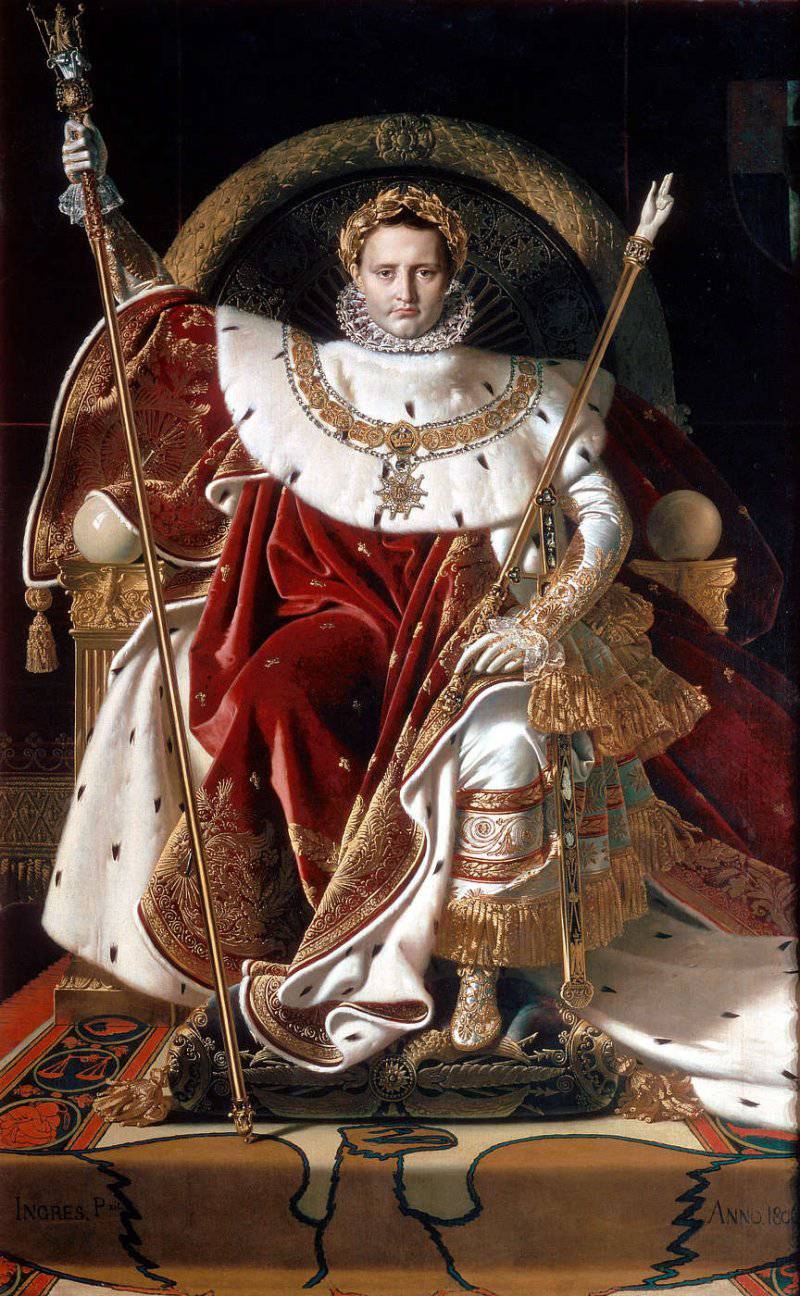France before confrontation with Russia
In the 1807-1808, France was at the peak of her power. All of Western and Central Europe submitted to the will of Napoleon. His troops entered the capital of Portugal, and the Portuguese government fled to Brazil. On the throne of Spain, the French emperor planted his elder brother Joseph, giving the Neapolitan kingdom to his son-in-law Murat, which belonged to the latter. In February 1808, the French forces occupied Rome, which, together with the Papal States, was later joined to the French Empire.
The British skillfully used the deposition of the dynasty of the Spanish Bourbons. Monarchs of other dynasties suspected that a similar fate could befall them. Especially attentive to this event reacted in Vienna. The Austrian Habsburgs believed that the danger approached them closely. The Russian emperor defended the Prussian dynasty, but who will help the Austrian house? Vienna accelerated the formation of the fifth anti-French coalition and its military preparations. In addition, the problem arose in Spain - the people responded to the overthrow of the dynasty by an armed uprising (the British also had a hand in it). A protracted war began on the Iberian Peninsula — it ran from May 1808 to April 1814. After the defeat and surrender of the French Dupont Corps in Bailen (July 23), Portugal rebelled. In Portugal, the British landed under the command of Arthur Wellesley, the future Duke of Wellington. 30 August Junot capitulated in Sintra. As a result, Europe saw two capitulations of the imperial French army in two months. It was a bounce. The invincible halo of the French army was greatly shaken. Napoleon himself said that the Bailen catastrophe (18 thousands of French were captured) was shamed by “our flags and the army”.
The Austrian embassy in Paris, headed by Clement von Metternich, has become an international anti-Napoleonic headquarters. Metternich was a very clever, deceitful and vicious person. He made friends with Talleyrand, Minister of Police Fouche and Russian Ambassador Tolstoy (he was against the union of Russia and France).
Erfurt Congress
To prevent the war with Austria and solve other problems, Napoleon had a powerful "trump card" - an alliance with Russia. This union still held great importance in the foreign policy calculations of the French emperor. Napoleon considered this alliance to be his most important achievement in previous years and had high hopes for him.
In Erfurt, from 27 September to 14 in October 1808, negotiations between the French Emperor Napoleon and the Russian Emperor Alexander I were held. The meeting was magnificently arranged, and all the Allied monarchs from numerous German states were invited to it. Monarchs and their retinues were entertained by famous artists of the French scene. In order to "appease" Alexander, Napoleon September 8 signed with the Prussian king an agreement on the withdrawal of French troops from Prussia.
Erfurt date can be divided into two areas. In the first - the front door, official, everything was in perfect tones. The play was played by the friendship of two great sovereigns, the immutability of the union of two mighty powers and complete mutual understanding. For two weeks there were ceremonial receptions, balls, performances, dinner parties, concerts with the participation of two emperors, the "stalls of the kings", titled aristocracy, marshals, diplomats, ministers, dignitaries, the first beauties of Europe. Napoleon led long conversations with the famous writers of Germany - Goethe and Wieland. In the second sphere, there was a hidden acute struggle. Napoleon, after Tilsit, understood that Alexander was much more complicated and cunning than he had thought before. Already during his exile on St. Helena, Napoleon, comparing the Russian emperor with the Austrian and Prussian monarchs, said: “The Russian emperor is a man standing infinitely above all these others. He has the mind, grace, education; he is seductive; but he cannot be trusted, he is not sincere, this is a true Byzantine of the era of the decline of the empire ... ” And further, if I die here, "he will be my true heir in Europe."
Alexander objected to Napoleon on almost all important issues. The Russian emperor even threatened to leave. One of the reasons for this was treason Talleyrand. The former foreign minister of France, held a pro-Austrian position and in a conversation with Alexander asked to save Europe "from Napoleon and for this purpose to object to the French emperor. This made a big impression on Alexander - the confidant of the Emperor of France calls for the struggle with Napoleon, which means that the affairs of the Napoleonic empire are really bad.
October 12 formal union agreement was signed, but he no longer had real power. After ostentatious agreement and long disputes, the last farewell meeting was unexpectedly warm. The two emperors had a long conversation with each other - the content of the conversation remained secret. They shook hands, hugged and kissed each other. This was their last meeting.

Meeting Napoleon with Alexander.
Spanish campaign
In a short time before the Pyrenees, the 150-thousand army was assembled, which included the imperial guard, the Polish division. The goal for Napoleon was clear: "It is necessary that Spain became French ...". Napoleon personally led the army. The best soldiers and commanders of the empire, like a firestorm, went through all of Spain, crushing any resistance in their path. The Spanish regular units and partisan detachments rolled back under the blows of the French regiments. 4 December Napoleon entered Madrid. He abolished all feudal rights, and all personal privileges associated with feudal legislation were equally destroyed. The second decree abolished and banned the courts of the Inquisition. All property of the Inquisition came at the disposal of the state. By following decrees, Napoleon reduced the number of monasteries by one third, their property became state property. Monasteries and religious institutions were placed under state control. In Spain, customs and other barriers between individual provinces were destroyed.
These were progressive laws, but the people did not accept them. The French were looked upon as occupiers. A "small" guerilla war was going on throughout the country. The defense of Zaragoza (December 1808 - February 1809 of the year), during which thousands of Spaniards died before 50, struck Europe with its courage and tenacity of defenders, when one of Napoleon’s best commanders, Marshal Lannes, took the city by storm, only corpses remained in it.
The winter of 1808-1809 of the year was particularly severe in Spain. There were continuous rains, sleet. Napoleon led the army towards the British troops. At the approaches to Astorga he was caught up by a courier from Paris. After reading the documents, after a brief hesitation, the emperor sat in a postal carriage and ordered to drive to France. He left the troops to Marshal Soult, when the British were already almost surrounded and the Spanish march could in a few days be crowned with an excellent victory. January 23 Napoleon was in Paris. Napoleon for the first time threw a military campaign unfinished. What happened?
The emperor received information that Vienna is concentrating troops on the border with Italy and Bavaria. In addition, he was alarmed by the news that Talleyrand and Fouche, previously irreconcilable enemies, show their alliance to Paris. Napoleon responded to this union with a catch phrase: “A vice leaning on the hand of a crime.” The French emperor felt that some dark game was being played against him. On January 28, he gathered senior dignitaries and accused Talleyrand of dishonor, deception and betrayal, calling it "silk shit". Interestingly, throwing terrible accusations in the face of Talleyrand, he left him free, as well as Fouche. Both traitors retained a high social position, influence, and could cause great harm to the empire, which they did. Napoleon showed strange carelessness, it will cost him dearly. Talleyrand the next day he met with the Austrian Ambassador Metternich and promised help in the fight against Napoleon. At the same time, I did not forget to demand several hundred thousand francs for the services. Naturally, his services were accepted. Talleyrand's cooperation with the Vienna Court continued both before and during the war between Austria and France. Talleyrand sent the most secret documents to Vienna: correspondence of Paris with Petersburg, directives to diplomats, military plans, information about the disposition of French troops, etc.
Austrian campaign
9 April 1809 Austria declared war on France. Early in the morning of April 10, the main forces of the Austrian army crossed the border on the Inn River and invaded Allied France Bavaria. In addition, an uprising began in Tyrol, and scattered guerrilla units came out in Germany. Austria has been preparing for this war for almost two years. Napoleon was not taken aback, he expected this attack. He was slow and did not start the war in advance due to external and internal political factors: it was important for the French public and Russia that Vienna should be the initiator of the war. France is already tired of constant wars. Yes, Napoleon himself did not want this war - he had enough other problems.
On April 15, the French emperor was in Strasbourg, 18 was in Ingolstadt and led the French forces. He gathered the troops into a strike force and launched an offensive. During the Regensburg operation (19-23 in April), the battles of Abensberg (20 in April), Landshut (21 in April) and Ekmühle (21-22 in April), the French forced the Austrians to retreat and defeated the army of the Duke Karl Ludovic Gustav Gustav Gustav Gustav Gustah Gus Gauberte Gus Gardoor Gus Gauberte Gus Gardoor Gus Gardoor Gus Gardoor Gus Gaudje Gustav H. Gladet Gustah Gustah H. Gladet Gustah Gustah H. Gladet Gustah Gustah H. Gladet Gustah Gustah H. Gladet Gus Gladet Gus Glade Gus Gard Gladet Gus Glade Gus Gard Glade Gus Gard Glade Gus Gauche Gus. The Austrian army lost up to 50 thousand people (French 16 thousand) and retreated to Vienna. Already 13 May Napoleon was in Vienna.
These defeats caused a sharp drop in the morale of the Austrians. The Austrian leadership did not expect such power from the French army. In Vienna, they believed that France was in a deep crisis, overestimated the failures in Spain. Napoleon, when he was informed about the optimistic forecasts of the Austrians, said: "I have not died yet." Such a start of the war was not expected neither in Vienna, nor in London, nor in Berlin. Three years the Austrians waited for revenge, carried out military reforms, borrowing the French experience, created a large reserve in the form of a landver, put up young generals. And then such a failure. In addition, Napoleon had to wage war, when about 300 thousand people got bogged down in the Spanish war. France waged war on two fronts. The French armies that operated in Germany and Austria mostly consisted of recruits and foreign regiments. The Germans from the 100 of the thousand army of the Rhine Union did not show enthusiasm, in the Austrians they saw a kindred people.
At the same time, Austria was not yet crushed. By mid-May, near Vienna, the Austrians gathered 115 thousand soldiers against 80 thousand French. On May 21, Napoleon's sappers transferred several bridges to the right bank of the Danube. 21-22 May 1809, the Battle of Aspern-Essling. The fight was very bloody and stubborn. Positions several times passed from hand to hand, Marshal Lannes was mortally wounded. Bridges were destroyed by the elements and the Austrian artillery, which made it difficult to transfer reinforcements and supplies. The Archduke Charles had at a critical moment with a banner in his hands to lead his soldiers to the attack. The Austrians were able to repel the onslaught of the French, who were almost twice as inferior in strength and to force Napoleon to retreat beyond the Danube. But the Austrians could not defeat Napoleon’s army. Both armies lost thousands of people in 23.
Many perceived this “crushing” defeat of the invincible Napoleon as evidence of the crisis of the French empire and Napoleon’s army. In addition, there were reports of failures in Spain. Soult, fascinated by the idea of his kingdom of Portugal, overlooked the British landing in Lisbon and was forced to retreat. His retreat resulted in Marshal Ney’s departure from Galicia. Sult and Ney were engaged in hostility towards each other.
Napoleon kept his composure and led the game to the aggravation. On the island of Lobau began to build fortifications and new bridges across the Danube. The pope was deprived of secular power, and his possessions became part of the empire. The head of the Catholic Church condemned the "wicked" emperor. 5-6 June French soldiers entered the pope's chambers and took Pius VII out of Rome. This for the beginning of the 19 century was a very audacious act. The emperor sends harsh letters to the brothers and Fouche. After receiving reinforcements from Bavaria, Napoleon again crossed the Danube and was able to catch the Austrians off guard. 5-6 July was the general battle of the Austro-French War 1809 of the year - the battle near the village of Wagram. The battle was fierce, the Austrians already knew that Napoleon could be beaten and fought well. Napoleon applied a novelty - a ram strike. For the breakthrough of the center of the Austrian army, three divisions under Macdonald's command were moved in close ranks, and they broke through the Austrian front. This breakthrough was crucial. Karl began to withdraw troops. But, the Austrian army was not destroyed and retained combat capability.
The Austrian command did not dare to continue the war and asked for a truce. Negotiations began, and the Schönbrunn peace treaty was signed on October 14. Under this agreement, Vienna lost access to the Adriatic Sea and approximately 100 thousand km² of its territory. The Austrian side pledged to transfer part of Carinthia and Croatia to the French Empire. The county of Görz (Gorica), Istria with Trieste, Krajna, Fiume (present-day Rijeka) went to France. Subsequently, the French emperor formed the Illyrian provinces. Western Galicia was ceded to the Duchy of Warsaw, Tyrol and the Salzburg Region departed from Bavaria, and Tarnopolsky District to Russia (as an ally of France). In addition, Vienna pledged to pay 85 million francs to Paris, reduce its armed forces to 150 thousand people (the Austrians did not fulfill this promise) and break off relations with Britain by joining the continental blockade against it. Napoleon I guaranteed the integrity of the possessions remaining with the Austrian Habsburgs. Austria de facto became dependent on France by the state.
Napoleon decided to consolidate the victory over Austria by a dynastic marriage. He had already thought about marrying the sister of the Russian emperor or the representative of the house of the Hapsburgs. Alexander refused such a proposal. And in Vienna, they took this idea as a happy find. The daughter of the Austrian emperor, Maria Louise, according to Metternich, was to play a huge role in the destruction of the Russian-French alliance. Destroying the union of Russia and France, the “Tilsit case” was an obsessive idea of the Austrian politician. 1 April 1810 was a civil wedding, and the next day a church wedding. In general, neither Paris, nor the people, nor the army, nor even the obedient elite approved this marriage. In France, they still remembered the execution of Marie Antoinette. This marriage was something offensive to the French people. It was one of the most unpopular acts of Napoleon. In addition, there was a split of the French elite. The courtyard of the new empress began to be formed mainly from the old nobility, connected with immigrant, royalist circles. Clan Bonapartes was in opposition.
The French Empire and Napoleon personally were at the height of their power. The possessions of France reached enormous proportions. Imperial eagles hovered from the Ebro to the Elbe. A tricolor French flag fluttered over Western and Central Europe. Prussia and Austria - the most powerful powers of Western Europe, were in a subordinate position. Napoleon, the former junior lieutenant of artillery, was combined by a dynastic marriage with a representative of the centuries-old house of the Habsburgs.
But at the same time, signs of decay were visible in the empire. French dignitaries wove intrigues and entered into contact with London and Vienna. There was a split of the French elite into several groups. The army and the war absorbed all the young male generation of the country, which negatively affected the agriculture, industry and morale of the population. The bourgeoisie was tired of wars of conquest, there was a desire to "digest" the already achieved fruits of victories. Vienna and London fought a secret war against France. The Spanish war turned into a protracted campaign, guerrilla war, which led to the destruction of Spain, forced to keep tens of thousands of French soldiers there. Sprouts of discontent made their way in Italy and Germany.
Napoleon in full imperial vestments.


Information